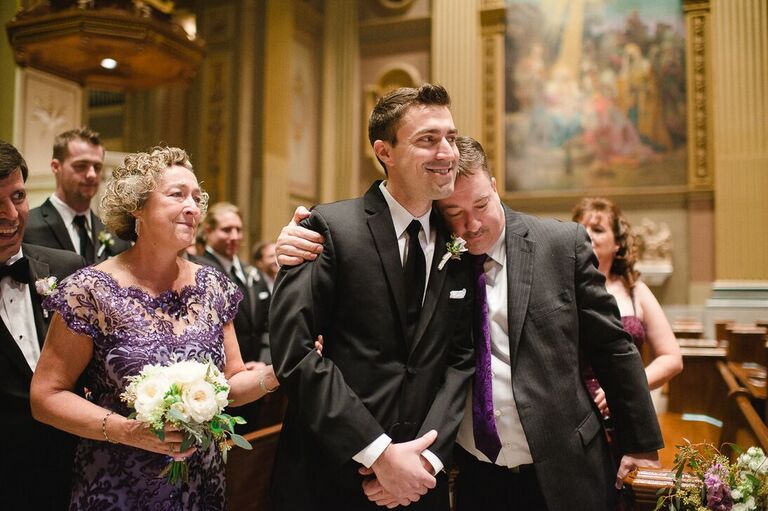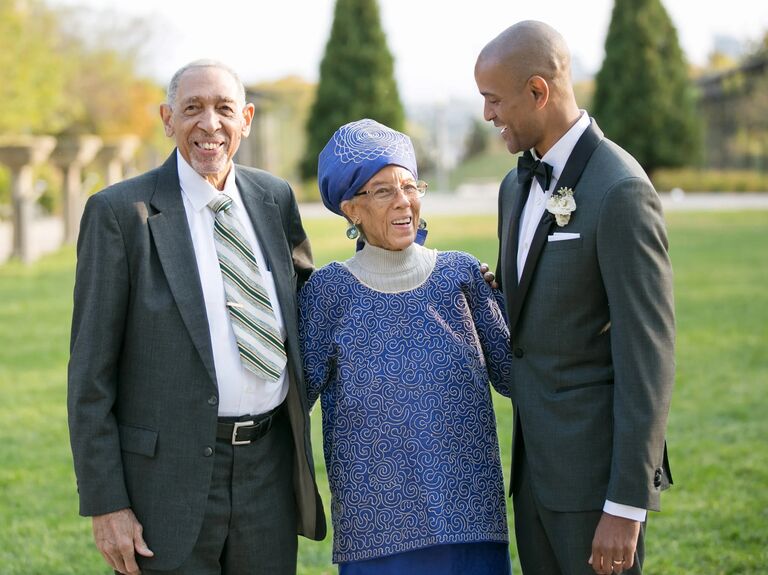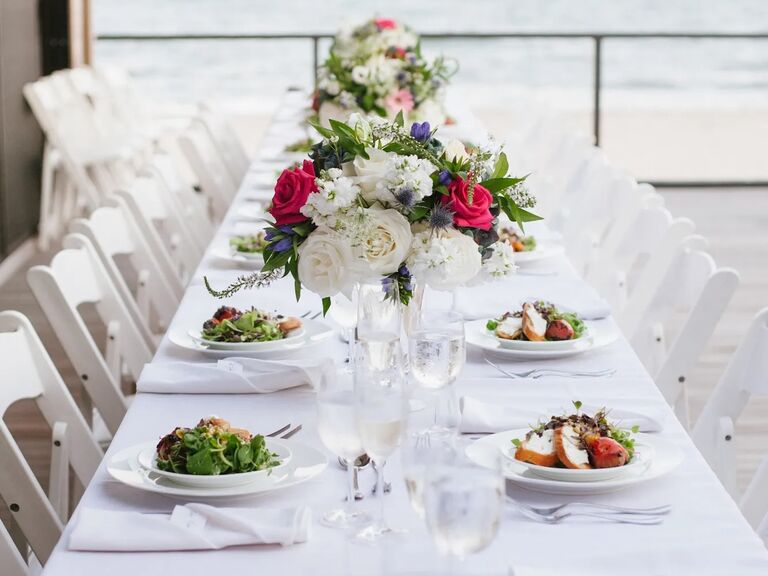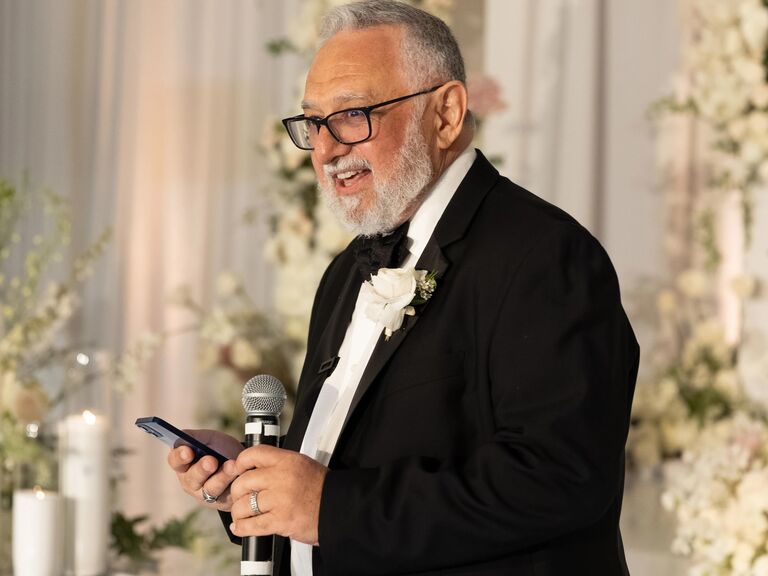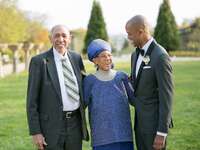14 Father-of-the-Groom Duties You Need to Know
While wedding planning can be overwhelming for an engaged couple, it's also daunting for their parents. In particular, the father of the groom's responsibilities aren't always obvious and may cause some confusion among the soonlyweds' family members. Does the father of the groom walk down the aisle? What does he typically pay for? Does the father of the groom give a speech? If so, when? Fortunately, we've got a list of traditional father-of-the-groom (a.k.a. FOG) responsibilities so everyone is clear on what needs to be done. Remember to think of this list as a suggestion, not law. All families are different and depending on a groom's relationship with his dad and the duties that the rest of the parents are taking on, the role of the father of the groom may differ from this list—and that's totally okay.
In this article:
- The Father of the Groom's Prewedding Responsibilities
- The Father of the Groom's Rehearsal Dinner Responsibilities
- The Father of the Groom's Wedding Day Responsibilities
The Father of the Groom's Prewedding Responsibilities
Many of the father of the groom's responsibilities are financial in nature (get those credit cards ready!), as well as planning and hosting pre-wedding events. In some cases, the father of the groom will also be included in the wedding party as the best man or groomsman, in which case he has a host of additional responsibilities related to that role. Read on for some father-of-the-groom duties that he'll need to handle before the big day.
Host an engagement party (optional).
The groom's family may opt to host an engagement party for the happy couple, however this is not required. Either set of parents, close friends or other family members may opt to host an engagement party, and yes, there can be multiple engagement parties in different locations.
Provide financial assistance for the wedding.
Okay, so you're probably wondering: What does the father of the groom pay for? At the beginning of the wedding planning process, the groom's parents should be consulted about their ability and willingness to contribute to the wedding budget. While the bride's family traditionally pays for most of the wedding, the groom's family can also chip in—and if the couple does not include a bride, the two families will need to decide who is paying for what. This may mean splitting wedding costs, or the couple may opt to pay for the event themselves. Both families should be clear on everyone's financial responsibilities before the planning process begins in earnest.
Traditionally, the groom's family pays for or contributes to the following wedding expenses:
- Engagement ring
- Wedding ring for son's spouse
- Groom's attire
- Marriage license
- Officiant's fee
- Certain floral arrangements, specifically the bride's bouquet, groomsmen's boutonnieres and corsages
- Wedding reception entertainment
- Alcohol
Go attire shopping.
The father of the groom may be invited to go attire shopping with the groom and groomsmen and help the groom pick out his wedding day outfit. The FOG's ensemble should match the formality of the groom and groomsmen, whether that's a tuxedo, suit or more casual attire. Unless the father of the groom is the best man or groomsman, he shouldn't wear the exact same attire as the wedding party but can wear complementary colors. For example, if the wedding colors are blue and silver and the groomsmen are wearing solid blue ties, the father of the groom might wear a tie with a silver and blue pattern.
Provide moral support and assistance where needed.
We all know that planning a wedding is hard work, and the soon-to-be-married couple will likely appreciate offers of additional help. The father of the groom can certainly offer up his services and see if there's any way he can provide assistance based on his interests and strengths, whether that's providing input on venue tours, serving as point person for certain wedding vendors, double-checking the guest list, helping with the seating chart or choosing ceremony music. Our main advice for the parents of the groom: Ask how you can help and follow the couple's lead, rather than forcing your way into the planning process.
Contribute to the honeymoon.
The groom's family traditionally pays for some or all of the honeymoon as a wedding gift to the couple. However, the couple may prefer to pay for their honeymoon themselves or have a honeymoon registry so wedding guests can contribute to their trip of a lifetime.


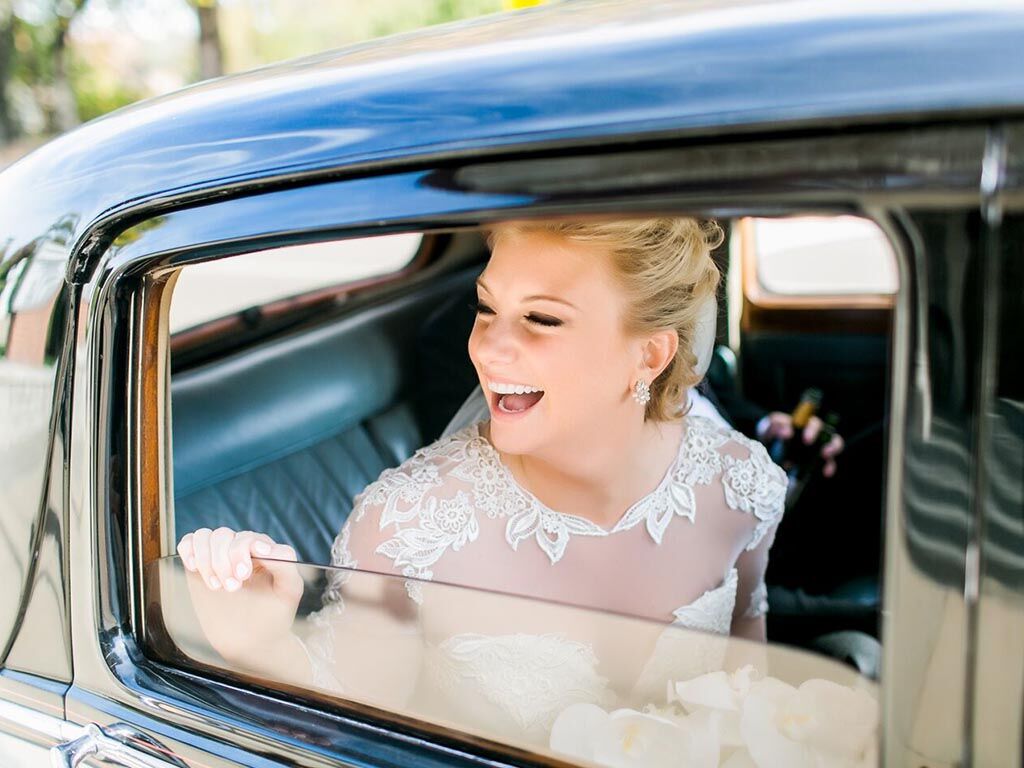
Plan and host the rehearsal dinner.
One of the most common father-of-the-groom responsibilities is to plan and host (read: pay for) the rehearsal dinner. This celebration, which usually takes place after the wedding ceremony rehearsal the night before the wedding, requires quite a bit of planning. The parents of the groom should work with the couple to decide the type of rehearsal dinner desired (an intimate affair or a blowout bash?), the location and the guest list. Once the basics are agreed upon, the groom's family can take the reins in putting together this night-before celebration, including booking a venue, hiring vendors, sending out invitations, collecting RSVPs and handling all associated costs.
The Father of the Groom's Rehearsal Dinner Responsibilities
The rehearsal dinner takes place the night before the wedding, and traditionally the groom's family plans the entire event. Here's a rundown of the responsibilities involved:
Plan (and pay for) the event.
Planning a rehearsal dinner is actually quite similar to putting together a wedding, though often on a somewhat smaller scale. If the groom's family is taking the lead here, they should consult with the couple on the event's basics—location, size and style—and then move forward with the planning process. Here's a quick checklist of tasks to keep in mind:
- Set a budget.
- Create a guest list.
- Book a venue.
- Book any associated vendors (florist, photographer, caterer, etc.).
- Plan the menu.
- Send invitations and collect RSVPs.
- Figure out who's giving toasts.
- Handle any last-minute details.
Serve as host.
On the day of the rehearsal dinner, hosting the event is primarily the groom's father's responsibility. That means that he will greet guests and be a point person for vendors.
Welcome guests and give a toast.
If the groom's family is hosting the rehearsal dinner, the father-of-the-groom speech will take place then—and it's usually the first speech to occur. During this toast, the FOG will welcome guests, thank those who traveled to and helped plan the event, say a few words about the couple, welcome his new child-in-law to the family and propose a toast to the soonlyweds at the event. The speech shouldn't be longer than four or five minutes, and the mother of the groom can also participate or give her own speech if desired.
The Father of the Groom's Wedding Day Responsibilities
The father of the groom's responsibilities don't end at the rehearsal dinner. In fact, the wedding day will be a busy one for the groom's dad. Here's a summary of his duties on the big day.
Get ready with the groom.
On the morning of the wedding, the father of the groom usually participates in any group activities (golf, basketball, etc.) and then gets ready with the groom and groomsmen. He also typically helps his son tie his tie, which makes for a sweet photo op.
Walk down the aisle with the mother of the groom.
In a Christian wedding ceremony, it's optional for the groom's parents to walk down the aisle. They are usually the first to walk down the aisle, immediately after all guests are seated, and are seated in the front row during the ceremony. At a Jewish wedding, the parents of the groom escort their son down the aisle after the groomsmen and best man and stand under the chuppah during the ceremony.
Greet guests.
If there is a receiving line before the reception, the father of the groom will participate and greet guests at that time. If not, the parents of the groom should make an effort to go table to table and say hello to all guests.
Dance with their son's new spouse (and possibly their mother).
While the father of the groom is not traditionally involved in the main parent dances, he should make an effort to dance with his son's new spouse at some point during the reception. The father of the groom may ask the mother of his son's spouse to dance near the close of the father-daughter dance.
Give a speech (sometimes).
While the father-of-the-bride speech is usually the main wedding toast, the father of the groom may also give a speech at the reception (especially if they didn't speak at the rehearsal dinner). We recommend creating a "speech schedule" of sorts so that all parents and wedding party members know when their toasts will take place.
Additional reporting by Shyla Watson
